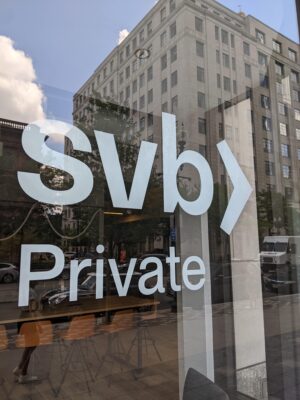The FDIC plans to sell the legacy Boston Private business separately from the rest of Silicon Valley Bank through a new process announced this morning.
The FDIC said in a statement this morning that it has extended the bidding process for Silicon Valley Bridge Bank amid substantial interest from multiple parties. The bidding process was originally scheduled to end yesterday.
“[T]he FDIC and the bidders need more time to explore all options in order to maximize value and achieve an optimal outcome,” the FDIC said.
Potential buyers will be able to submit separate bids for Silicon Valley Bridge Bank and its subsidiary Silicon Valley Private Bank. Silicon Valley had launched the private bank when it acquired Boston Private in July 2021.
Separating the bids will help simplify the bidding process, the FDIC said, and expand the pool of potential bidders. Eligible bidders include insured banks and insured banks collaborating with nonbank partners.
SVB Private bids are due this week by 8 p.m. Eastern Time on Wednesday, and Silicon Valley Bridge Bank bids will be accepted until 8 p.m. on Friday.
Potential buyers do not have to submit bids for the entire institutions. The FDIC said it would accept whole-bank bids or bids on the deposits or assets of the institutions. Bank and non-bank financial firms will be permitted to bid on the asset portfolios, the FDIC said.
Silicon Valley Bank and SVB Private were operating segments within the parent company SVB Financial Group, which also included SVB Capital and SVB Securities.
The company still had separate branches for Silicon Valley Bank customers and former Boston Private customers, according to the bank’s website, which noted that full service at all branches was coming soon. Boston Private initially kept its branding after the July 2021 merger, before the SVB Private name launched in early 2022.
With the merger, SVB acquired the $17.98 billion in assets that Boston Private’s wealth management arm had under management or administration, a significant increase over the $1.6 billion SVB had at the start of 2021, according to its annual report published in February 2023. The wealth division had $329 million in net flows and $2.68 billion in losses due to market performance last year, for an ending balance of $17.29 billion in assets under management and assets under administration as of Dec. 31, 2022.
SVB Private clients also represented 14 percent of the company’s total loans at the end of 2022, up from 13 percent at the end of 2021, according to the annual report. The bank said the report that 87 percent of the private bank portfolio was secured by real estate, including through mortgage loans, owner-occupied commercial mortgage loans, home equity lines of credit and other secured lending products. The rest of the SVB Private loan portfolio included personal capital call lines of credit, restricted and private stock loans and other secured and unsecured lending products.
Much of the executive leadership team that led the private bank after the July 2021 acquisition has left SVB. Anthony DeChellis, who led Boston Private through the merger and was SVB Private’s first CEO, left the bank in November 2022, according to his LinkedIn profile. AdvisorHub reported his departure in October 2022.
Yvette Butler, who had been with Silicon Valley Bank since 2018 and was SVB Private’s president, left in April 2022, according to her LinkedIn profile. The private bank’s head of commercial banking, Jim Brown, left the bank in November 2021, according to LinkedIn, and joined Berkshire Bank as head of commercial banking and senior executive vice president earlier this year. Brown had spent 20 years at Boston Private.
SVB had announced in December 2022 that Erin Platts, head of its business in the United Kingdom, would take over as president of SVB Private. According to LinkedIn, Platts remains with the UK business, which was acquired last week by HSBC.







